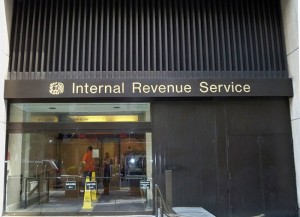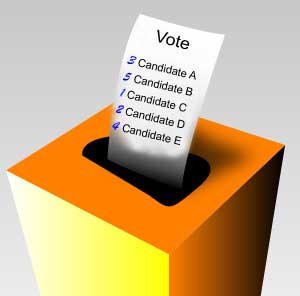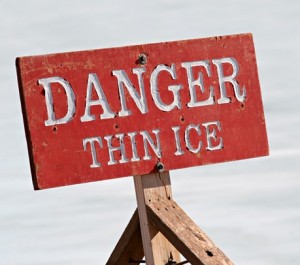Another Federal Scandal?
May 22nd, 2013 // 3:59 pm @ Oliver DeMille
 The Obama trifecta of scandals including Benghazi, IRS targeting, and AP phone records is now joined by another potential scandal.
The Obama trifecta of scandals including Benghazi, IRS targeting, and AP phone records is now joined by another potential scandal.
The EPA is accused of ongoing “Sue and Settle” practices, which means that they work with left-leaning environmental groups who file suits against a federal agency and then the attorneys work out settlements that are beneficial to both sides.[i]
All of this, it is alleged, is based on “a prearranged settlement agreement they craft together behind closed doors …. While the environmental group is given a seat at the table, outsiders who are most impacted are excluded, with no opportunity to object to the settlements.”[ii]
And taxpayers foot the bill for millions of dollars in costs.
As the scandals become a mainstream topic of media coverage, other agencies may face further scrutiny.
And as government gets bigger and bigger, the executive branch and its many agencies are less and less accountable.
When government is too big, the number of scandals will predictably increase.
Whether or not the EPA issue becomes a point of mainstream discussion, this new era of scandal has rekindled the question of trust in government.
Historically, governments and officials who truly have nothing to hide urge the citizenry to be generally mistrustful of government.
For example, the American founding generation felt that such mistrust of state and federal institutions was a hallmark of a wise and free people.[iii]
Indeed, the entire Constitutional framework is based on the fundamental assumption that those in power must be mistrusted and closely watched.[iv]
In more recent eras, governments have consistently called for people to give great trust to the government, even as agencies have become less transparent, more secretive, and less trustful of the people.
In short, there is a real trust deficit in our society—but it isn’t what officials and the media usually suggest.
The real problem is that government is lest trustful of its citizens, and the people are less likely than past generations to keep a close eye on potential government abuses.
The natural result is a steady decline in freedom.
This may have sounded alarmist a month ago, but in the wake of current scandals it is mild compared to what many pundits are saying.
How many more federal scandals are waiting in the wings?
More importantly, at what point will enough citizens finally stand up and begin to lead again?
Freedom only lasts when the people are closely involved in overseeing government and serving as the final arbiters of government power.[v]
Until the people refocus on this role, America’s current decline will inevitably continue.
[i] Larry Bell, “EPA’s Secret and Costly ‘Sue and Settle’ Collusion With Environmental Organizations,” Forbes.com, February 17, 2013.
[ii] Ibid.
[iii] See Federalist 48-51.
[iv] Federalist 48.
[v] Federalist 46. See also, John Locke, Second Essay Concerning Civil Government, and the 1776 Virginia Declaration of Rights.
***********************************
 Oliver DeMille is the chairman of the Center for Social Leadership and co-creator of Thomas Jefferson Education.
Oliver DeMille is the chairman of the Center for Social Leadership and co-creator of Thomas Jefferson Education.
He is the author of A Thomas Jefferson Education: Teaching a Generation of Leaders for the 21st Century, and The Coming Aristocracy: Education & the Future of Freedom.
Oliver is dedicated to promoting freedom through leadership education. He and his wife Rachel are raising their eight children in Cedar City, Utah.
Category : Blog &Citizenship &Current Events &Featured &Government &Leadership &Politics
The Silver Lining in The Scandals
May 21st, 2013 // 4:42 pm @ Oliver DeMille
 It’s starting to seem like it was the Obama Administration that made the following saying famous: “A crisis is a terrible thing to waste.”
It’s starting to seem like it was the Obama Administration that made the following saying famous: “A crisis is a terrible thing to waste.”
The idea behind this quip was that when a big crisis came, the White House should use it to push its big-government agenda.
In an ironic twist, the current triple scandals (IRS, Benghazi, and Associated Press) are accomplishing exactly the opposite.
The White House and indeed most of the executive branch is spending a great deal of its energy right now dealing with the scandals.
The result is that less money, time and effort are being spent on spreading big government.
At the same time, more Americans are paying attention to what is happening in Washington.
The word “scandal” seems to create more interest in what is happening than business as usual.
The more citizens who pay close attention to what the government does, the better for freedom.
In short, we’re experiencing at least two positive side effects of the current scandals:
- The executive branch is doing less, because it is focused on responding to the scandals
- More regular citizens are watching their government.
It’s sad that it takes scandal to accomplish such things, but at least they are happening.
Perhaps the most amazing thing in all this has been the Administration’s continued trust in government agencies.
After all the press and firings in the aftermath of government officials enjoying taxpayer-funded trips to Jacuzzis in Hawaii, you’d think the White House would be carefully watching its agencies and officials.
But even though it has asked for resignations from various agency officials, the Administration has emphasized that lone people and/or “isolated” bureaus made mistakes and held fast to the idea that government should be trusted.
At the same time, the Administration continues to express major distrust for businesses and pretty much anyone outside of government.
Why the double standard?
The various press briefings from the Administration emphasize a sense of, “Just trust us; after all, we’re the government. Of course we are telling the truth and doing the right thing.”
This flies in the face of the Framers’ view of government.
The American system and Constitution were founded on the idea that government is dangerous and that freedom can only last if the people mistrust the government and keep a close eye on it in order to keep it in line.
As Jefferson put it: “Let no more be said of confidence in man, but bind him down from mischief by the chains of the Constitution.”
In Jefferson’s world, the assumption was that government officials should be generally suspected of being involved in “mischief.”
A healthy mistrust of government was a central point to maintaining freedom.
George Washington said: “Government is not reason, it is not eloquence—it is force! Like a fire, it is a dangerous servant and a fearful master.”
Madison added that government is the most dangerous threat to freedom: “I believe there are more instances of the abridgement of freedom of the people by gradual and silent encroachments of those in power, than by violent and sudden usurpations…”
For Madison, the great danger to freedom was government increasing its power over the people in “gradual and silent” ways.
Government has done this for a long time, and under the leadership of both parties at different times.
When it gets caught, it’s a scandal.
Just as the Johnson Administration is known for Vietnam and the Nixon era for Watergate, many other presidencies are known for their crises: Reagan for Iran-Contra, Bush I for higher taxes after promising it wouldn’t happen, Clinton for the Lewinsky affair, and Bush II for missing weapons of mass destruction.
In all this, why exactly do politicians keep suggesting that trust in government is the solution to America’s problems?
Such situations are basically the only times (under our current system) when the people are likely to make their influence felt and help other citizens see the dangers of big government.
Now is such a time.
In fact, America was founded on the belief that a healthy and active mistrust of government was essential to staying free!
We need more citizens to realize that Washington isn’t going to fix our biggest national problems, that the only real solution is for more Americans to be better citizens.
If we don’t get more involved and help take our nation in the right direction, more scandals will come.
A lot more.
What happens in Washington in the weeks ahead as these three scandals play out is less important than what happens among the regular people.
If we emerge from this crisis as a nation that still basically trusts its government, there will be no silver lining in the scandals.
If we as a people realize that as government grows, these type of crises will increase, we will at least learn something from all this.
If we as a people become more prone to keep a close eye on our government, to wisely and peacefully mistrust it and at the same time get more positively and proactively involved to ensure that it truly does the will of the people, this year can be a helpful turning point in America’s history.
A crisis is a terrible thing to waste.
And three of them at once is a huge opportunity.
If we ever do turn America back to a path of freedom, away from overreaching big government, it will be during a time like this.
***********************************
 Oliver DeMille is the chairman of the Center for Social Leadership and co-creator of Thomas Jefferson Education.
Oliver DeMille is the chairman of the Center for Social Leadership and co-creator of Thomas Jefferson Education.
He is the author of A Thomas Jefferson Education: Teaching a Generation of Leaders for the 21st Century, and The Coming Aristocracy: Education & the Future of Freedom.
Oliver is dedicated to promoting freedom through leadership education. He and his wife Rachel are raising their eight children in Cedar City, Utah.
Category : Blog &Citizenship &Constitution &Current Events &Featured &Government &Politics
Electionocracy
May 21st, 2013 // 12:22 pm @ Oliver DeMille
 We now live an Electionocracy. This means that the elections never end.
We now live an Electionocracy. This means that the elections never end.
Once a person is elected to office, especially at the national level, he or she doesn’t get to stop campaigning and focus on governing.
Instead, everyone in office is required to keep campaigning even as they serve.
One the one hand, this is a negative development in a democratic republic because it keeps election politics always in the limelight.
The president is seldom seen as the nation’s chief executive, for example, but as the head of the Democratic or Republican Party.
Thus, even as he tries to govern and lead, he is forced to keep one eye constantly on politics.
That’s the bad news.
The good news is that this keeps more of the American people involved and paying attention to the actions of government.
Also, it keeps the executive branch from overextending even more than it already does—because it has to put a lot of resources into politics.
This is actually a positive in a nation where the biggest problem is massive government.
With all that said, people are already lining up to influence the midterm elections of 2014 and even the presidential election of 2016.
Here are a few tidbits:
- Many pundits feel that the IRS scandal of targeting conservative groups will have more negative impact on the Democrats in the 2014 midterm election than anything else since the Obama Administration took office. It may serve as the Democrat’s Achilles heel.
- Hillary Clinton is far ahead in polls of possible Democratic candidates, but she is only a few points ahead of some top potential Republican challengers. In contrast, the leading Democratic candidate has been far ahead at this point in recent elections.
- In early fundraising, Marco Rubio is ahead of Rand Paul. Chris Christie and Paul Ryan are also strong in the polls, but for now Rubio seems to have an edge.
But the biggest shocker in all this is that the central issue of the 2014 and especially 2016 elections will probably be Obamacare.
This is surprising to many progressives, who felt that this issue was over when it passed in 2010, then when the Supreme Court upheld it in 2012, and later once President Obama was reelected.
But this issue just won’t go away.
Even though Barack Obama was and is personally popular, his health care policy remains highly unpopular with many Americans.
This disapproval is increasing with the Benghazi, IRS, AP and other scandals. Each time a few more people lose trust in government, they tend to increasingly dislike Obamacare.
So, yes, we now live in what could easily be described as an Electionocracy, and things will probably only heat up in the coming months.
Both parties will blame each other for most of America’s ills, and the number of crises will likely increase.
That’s our current direction, and nothing seems poised to bring real solutions any time soon.
In truth, the future of America is ultimately up to the actions and choices of regular Americans more than those of Washington.
But who we elect will have a drastic influence on the nation’s direction in the years just ahead.
If you want to know how elections are going to turn out, keep a close eye on how most Americans feel about Obamacare—especially as it is further implemented in the next three years.
Any significant changes in approval or disapproval of Obamacare will signal the trajectory of the next two elections.
In an Electionocracy, it appears that one or a few top issues will determine who leads our nation.
***********************************
 Oliver DeMille is the chairman of the Center for Social Leadership and co-creator of Thomas Jefferson Education.
Oliver DeMille is the chairman of the Center for Social Leadership and co-creator of Thomas Jefferson Education.
He is the author of A Thomas Jefferson Education: Teaching a Generation of Leaders for the 21st Century, and The Coming Aristocracy: Education & the Future of Freedom.
Oliver is dedicated to promoting freedom through leadership education. He and his wife Rachel are raising their eight children in Cedar City, Utah.
Category : Blog &Citizenship &Culture &Current Events &Featured &Government &Politics
Why We Need a Third Party
November 17th, 2012 // 10:36 am @ Oliver DeMille
In the aftermath of the 2012 election, there have been numerous emails, posts, articles and blogs by business owners who say they are planning to sell or close their businesses, or just lay off enough workers that they can afford Obamacare for the employees who remain.
One summary listed the following announced layoffs—all attempts to deal with the new costs of Obamacare:
- Welch Allyn, 275 layoffs
- Stryker, 1170 layoffs
- Boston Scientific, between 1200 and 1400 layoffs
- Medtronic, 1000 layoffs
- Smith and Nephew, 770 layoffs
- Hill Rom, 200 layoffs
- Kinetic Concepts, 427 layoffs
- Coviden, 595 layoffs
- Abbot Labs, 427 layoffs
- St. June Medical, 300 layoffs
There are many, many others.
One email dated November 7, the day after the election, read:
“Time to sell our business. We can no longer afford to provide a living for 14 employees as soon we’re forced to pay for their healthcare. So sad, too bad. On to new ventures.”
After responses about how sad this is and others pointedly blaming the Obama Administration, the same person continued:
“We are all Americans and need to find common ground and make this country great together. I’m not mad at anyone for voting different than me. They love their president, don’t lose friends over calling him a dictator. I’m excited to sell our business. We are adventurous!”
That’s the entrepreneurial spirit that made America great.
Not: “Oh no, we’re losing our job. Will the government help us?”
But rather: “Hey, change happens. We’re excited. This is going to be an adventure!”
That’s the American spirit.
And while rumors abound about how much Obamacare will cost each small business and which won’t have to make any changes at all, there are a lot of employers right now who are very concerned.
Those with under 50 employees aren’t supposed to be hurt, but smaller employers are still worried about exactly how the new laws will be enforced.
Sadly, we will likely see a lot of change in small business in the months and years just ahead.
More regulation, higher taxes and drastically increased costs of employing people will make things more difficult.
An exception may be in network marketing companies or compensated communities.
I’ve long considered them among the top entrepreneurial opportunities in free nations, and with the current changes and policies this is even more true.
“My son is a doctor,” Marge said proudly.
“Wow,” Betty said with a concerned voice. “How is your son dealing with the new regulations coming into effect under Obamacare?” she asked.
Marge nodded and her face grew serious. “He’s very concerned, to tell the truth.”
“Fortunately, my son is building a huge network marketing company, and the regulations aren’t hurting him much,” Betty said. “Maybe your son would like to meet with mine about an opportunity?”
This kind of conversation is taking place a lot right now, and all indications are that it will increase.
Some parents are recommending that their college children put school on hold and start a network business, and I know two medical doctors who have gotten out of the profession in order to build networking businesses.
One of them talked two of his sons into quitting college and doing the same, though the three of them all ended up building networking organizations with entirely different companies.
II. The Party of Small Business
All of this got me thinking today, and as I pondered I realized something. Something big.
Something we really need right now in America.
We need a third party.
Actually, we need a new party that becomes more popular than the Republican Party and the Democratic Party.
There are more independents than members of either big party, so this shouldn’t be too much of a stretch.
Here’s the problem: The Democratic Party is now the unabashed party of big government, the welfare state, rule from Washington D.C., and everything that goes with these values.
The Republican Party touts itself as the party of freedom, limited government, free markets and business, but in fact it is the party of big business and a big-spending government at the same or just slightly lower levels than Democrats.
We have a party of Big Government (with big business as its co-pilot), and another party that emphasizes Big Business (with big government as its co-pilot).
The first is the Democratic Party, the second the GOP.
Neither is now effectively serving the needs of our nation.
As a result, we get bigger government regardless of who gets elected, and big business grows (to the frequent detriment of small businesses) regardless of who is in power in Washington.
In all of this, small businesses, families, communities and the middle class are the losers.
The solution? We need a party of small business.
We need a party whose top priority is the needs of families and small businesses.
This new party needs to reject the big-government and anti-free enterprise values of the Democrats and simultaneously the big-business and anti-immigrant attitudes of Republicans.
It needs to embrace toleration, diversity, reduced government regulations, lower taxes, decreased government spending, incentives for entrepreneurship, a charitable safety net, and incentives for more immigrants to bring their capital, businesses, labor and families to America.
It needs to get rid of the barriers to hiring (such as the increasing required health care costs) and drastically reduce government red tape for small businesses.
It needs to allow more innovation, shrink requirements on licenses and permits and other unnecessary costs that decrease entrepreneurship and growth, and create an environment of seamless partnerships between schools and businesses.
It needs to promote, encourage and incentive a lot more initiative, innovation and entrepreneurialism.
It also needs to push for more creative and independent thinking in the schools and less that is rote, conveyor-belt, and pre-scripted.
It should change the way schools are run, replacing an environment where administrators and bureaucrats feel comfortable to one led by proven innovators and others who have been successful in the real economy, the FOR-profit economy.
Forget teacher certification and unions—if we want to compete in the global economy we need innovators leading our classrooms.
As an example, principals and teachers should be hired who have excelled at implementing successful business plans rather than writing resumes.
And funding should flow to schools that excel in a true free market.
To ensure to that no child is left behind (for example in less-advantaged neighborhoods), even larger premiums should go to innovators who successfully turn dumpy schools into flourishing institutions whose graduates thrive.
The new party should apply similar principles to other kinds of organizations, from health care and community governments to every other sector of the economy.
Small businesses bring the large majority of growth in the economy, and the new party needs to begin with the specific needs of small businesses in mind.
It needs to identify things that hurt small business and repeal them, and find out what helps small businesses succeed and introduce more policies that encourage these things.
It needs to rewrite the commercial and legal code to create an environment where innovation is the norm, along with the values of growth, calculated risk, leadership, creativity, and entrepreneurialism.
It needs to be not the party of jobs, but the party of successful business ownership—and the jobs they naturally create.
III. A Bright Future?
We need a third party. The party of Big Government (with big business as co-pilot) and the party of Big Business (with big government as co-pilot) simply aren’t doing what our nation needs anymore.
It’s time for new thinking and new leadership.
There is an old saying that you can’t pour new wine into old bottles, because the residue of past wine always taints the new.
This is where we are in America.
The current parties, as much good as both have done at times, have peaked and are in decline.
New leadership is needed, along new values untainted by the baggage of two parties whose time has come and gone.
It is perhaps possible to reform one of the parties to get better results, but it is likely that only a new party with an entirely new focus and fresh thinking is going to take America where it needs to go.
Democratic nations are notorious for refusing to change until crisis forces their hand, and I suspect this is what we’ll witness in the 21st Century.
At some point, probably after major crisis and a superhuman American response, we’re going to need a new party.
Those who love freedom should start thinking about what it should look like.
One thing is clear: When it does come, it needs to be a party of small business.
Free enterprise and the entrepreneurial spirit made America great, and it will do so again if we let it.
Whatever comes in the economy, we want to be led by those whose attitude is, “It might sound bad, but this is an exciting adventure! Let’s get started…”
***********************************
 Oliver DeMille is the chairman of the Center for Social Leadership and co-creator of Thomas Jefferson Education.
Oliver DeMille is the chairman of the Center for Social Leadership and co-creator of Thomas Jefferson Education.
He is the author of A Thomas Jefferson Education: Teaching a Generation of Leaders for the 21st Century, and The Coming Aristocracy: Education & the Future of Freedom.
Oliver is dedicated to promoting freedom through leadership education. He and his wife Rachel are raising their eight children in Cedar City, Utah.
Category : Blog &Business &Citizenship &Community &Constitution &Culture &Current Events &Economics &Entrepreneurship &Family &Featured &Government &Independents &Leadership &Liberty &Mission &Politics &Producers &Prosperity &Statesmanship
AFTER THE ELECTION: The Year of Danger
November 8th, 2012 // 5:51 pm @ Oliver DeMille
The year ahead is a time of danger.
The election of 2012 is over, and you are either happy or upset with the outcome—or, like many independents, you are predictably frustrated with the whole system.
Whatever the case, the next few months is a time of real danger in our nation.
During elections, energy and citizen participation is high.
After elections, it reaches all-time lows. People of all political views tend to focus on other things and leave governance to the politicians.
America has serious challenges ahead, and many of them kick in right at the beginning of 2013.
Moreover, during the next year we will almost certainly determine whether or not the United States is going to fall off the looming financial cliff.
Concerns include:
- The rapidly growing debt
- The overwhelming reality of entitlements
- The growing deficit
- The weakening national credit rating
- The struggling role of the U.S. Dollar as the world’s reserve currency
- Various looming bubbles in the market
- A coming inflation crunch
- A further middle-class squeeze on jobs and discretionary income
- A tax rate that is driving more businesses abroad (or out of business)
- A very nervous small business community that is uncertain about growth or hiring
- Weak consumer demand that is causing businesses to produce less (and cut jobs)
- A rapidly expanding government sector that is threatening free enterprise
Washington needs to address these concerns quickly to relieve business anxiety that we’ll just see more of the same (or worse) from the government for the next four years.
After all, without the necessity of reelection the Obama Administration could be truly anti-business.
Hopefully, in contrast, President Obama will see this as an opportunity to really work with Republicans to fix these major national challenges.
The larger problem is that democratic societies seldom take action until they feel direct pain.
Indeed, democratic nations are notoriously bad at anticipating pain and taking action ahead of time, so they seldom stop crises but rather wait until it is too late to get serious about solutions.
We need real solutions in the months and year just ahead, and we can’t afford to wait for more crises.
We must immediately address the economic realities above (and others like them), at the very time the citizenry is the least likely to stay actively involved.
Whatever your political views, America needs you to stay enthusiastically engaged in watching and influencing government. Now more than ever.
Right now begins the year of danger in government and the future of the economy, and only the first branch of government—the people—can truly ensure that things go well.
The alternative is further major economic downturn.
***********************************
 Oliver DeMille is the chairman of the Center for Social Leadership and co-creator of Thomas Jefferson Education.
Oliver DeMille is the chairman of the Center for Social Leadership and co-creator of Thomas Jefferson Education.
He is the author of A Thomas Jefferson Education: Teaching a Generation of Leaders for the 21st Century, and The Coming Aristocracy: Education & the Future of Freedom.
Oliver is dedicated to promoting freedom through leadership education. He and his wife Rachel are raising their eight children in Cedar City, Utah.
Category : Blog &Citizenship &Current Events &Economics &Entrepreneurship &Featured &Government &Independents &Leadership &Liberty &Mission &Politics












